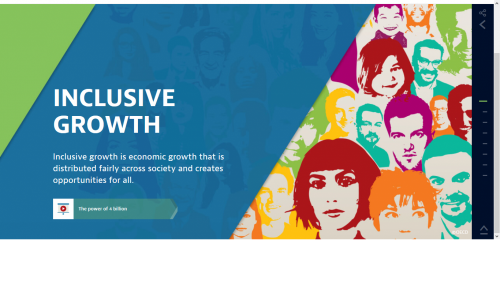
http://www.oecd.org/inclusive-growth/new-oecd-framework-seeks-to-drive-u...
To help countries assess their progress in achieving more inclusive growth, the OECD has created a new dashboard of indicators on issues ranging from income, growth and employment to education, environment and governance. Over time, the dashboard indicators can help countries and their citizens monitor progress toward inclusive growth goals.
The OECD has also developed the new Policy Framework, which puts the emphasis on ensuring low-income groups access to quality services so that they can contribute to increases in productivity, growth, and well-being.
“It’s vital that countries progress in their efforts to transform economic growth into improved living standards for all,” said OECD Chief of Staff and G20 Sherpa Gabriela Ramos, leader of the Inclusive Growth Initiative at the OECD, launching the report at the OECD Forum in Paris. “We need to help the poorest in society achieve their full potential, and ensure that governments have the tools to deliver. OECD analysis shows that when policies targeting the most disadvantaged deliver, everyone in society sees gains in prosperity and well-being.”
Early numbers detailed in the new Framework reveal that social background continues to determine the life chances of people in many OECD countries. Overall, every third child in low-income families lives in an overcrowded household troubled by housing costs, youth from poorer backgrounds have only an 18% chance of pursuing a career in science, and 38% of their earnings will depend on parents’ situation. And in many countries, children from poorer backgrounds at the age of 15 are a year behind in academic performance from better off children, according to results from the OECD’s international PISA education survey.
The report also shows how varied policy areas – from transportation to healthcare – intersect to affect well-being. For instance, social mobility is still hampered by limited access to quality healthcare services, education and transport services that are poorer for low-income groups and people living in lagging regions.
To address these challenges, the OECD recommends that countries take advantage of the returning growth of the global economy to put in place more ambitious structural reforms that put equity considerations first. Any short-term costs from reforms may be lower and shorter-lived when demand and job creation are stronger, says the report.
The Framework highlights three key areas where countries should focus their efforts to:
- Invest in people and places that have been left behind, particularly children in precarious conditions, through: targeted quality childcare, early education and life-long learning; effective access to quality healthcare services, education, justice, housing and infrastructures; and optimal natural resource management for sustainable growth.
- Support business dynamism and inclusive labour markets through: broad-based innovation, fast and deep technology diffusion; strong competition and vibrant entrepreneurship; access to good quality jobs, especially for women and under-represented groups; and more efforts to help people adapt to the future of work.
- Build efficient and responsive governments through: aligned policy packages across the whole of government; putting equity at the centre of the design of policies; and involving citizens in policy-making while strengthening integrity, accountability and international coordination.
The OECD Framework for Policy Action on Inclusive Growth builds on a range of OECD projects and strategies, including the Productivity-Inclusiveness Nexus, the Jobs Strategy to be released later this year, Skills Strategy, Innovation Strategy, Going for Growth Strategy, Going Digital project and Green Growth Strategy. The OECD plans to pilot through country-specific studies on Inclusive Growth that would help governments put in place a roadmap to grow more inclusively.
The report is available at http://www.oecd.org/economy/opportunities-for-all-9789264301665-en.htm
More information on the OECD’s Inclusive Growth Initiative is available at http://www.oecd.org/inclusive-growth/










Add new comment